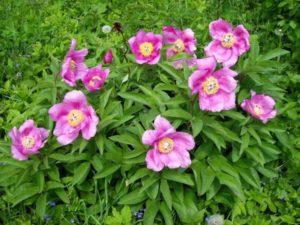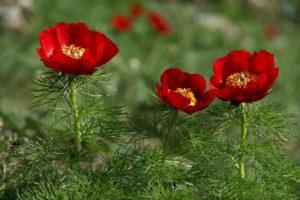Characteristics and description of Sorbet peonies, planting and care
The unpretentious herbaceous peony Sorbet attracts with its laconic appearance and bright aroma. Representatives of the variety give a finished look to the strictest landscape design. Graceful buds attract attention and do not leave you indifferent. Agricultural technology is simple, it consists in regular loosening, watering, dressing, protective measures.
Description and features
The mid-flowering Sorbet grows up to 1 meter in height. The bush fascinates with strong stems, on which large cupped buds with pale pink pastel petals are placed. Flowers reach a diameter of up to 19 centimeters, turn pale by the end of flowering.
Openwork, lush, dissected leaves remain on the branches until late autumn. In this case, the dark green color changes to a crimson hue. The plant is frost-resistant and drought-resistant.
Breeding history
Holland is a country known for its quality flowers. It is the Netherlands that sets the standards and the best plant breeding. Varieties differ in the size of the inflorescences, color, height and shape of the bushes. Sorbet buds attract the attention of florists and landscape designers, as they look great in bouquets and flower beds.
Landing
Responsible planting ensures abundant flowering and long plant life.
Seat selection
The choice of the site on which it will grow is important for the growth of the crop.
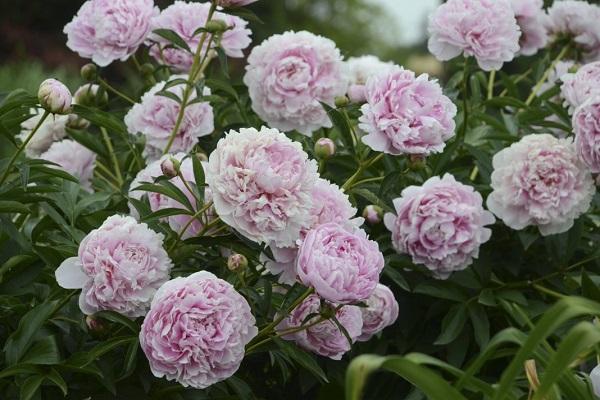
Illumination
The variety feels comfortable in well-lit areas. However, the plants are not drought-resistant, they like light shading from the sun.
Draft protection
The culture does not like drafts, so it is recommended to plant in areas protected from the wind.
Deep occurrence of groundwater
The selected area for planting the plant must have a deep groundwater table in order to prevent root rot.
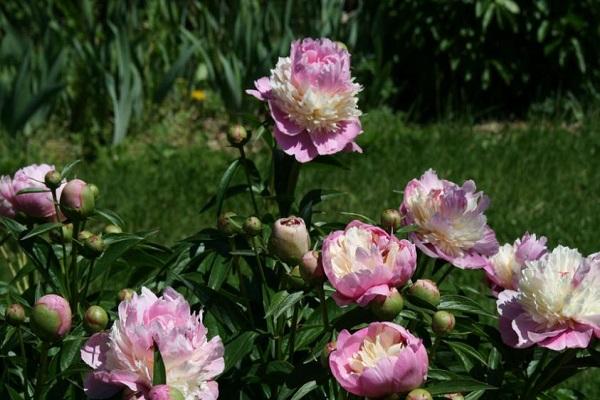
Ground requirements
In order for the culture to annually please with abundant flowering, the soil on the site must be slightly acidic and with a loose structure.
Important: the soil, if necessary, can be flavored with peat or sand.
In the case when the soil is acidic, lime is added.

Timing
A favorable time for planting a plant is the end of August. If the seedling is planted in spring, then the period is chosen early - until a steady warming begins.It is recommended to plant in April-May, before the shoots regrow.
Landing scheme
The culture is planted in pits prepared 1 week before planting, measuring 50 by 50 centimeters. The bottom of the hole fits:
- drainage;
- sand;
- peat;
- organic or mineral fertilizer;
- garden soil.
After planting, the plant is watered abundantly.
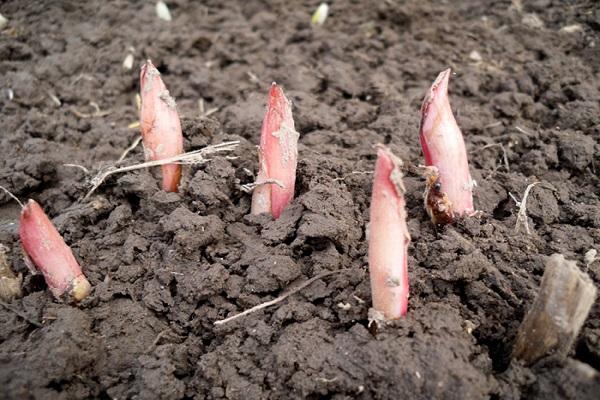
Care
The main care consists in watering, weeding, pruning and feeding the crop.
Watering
The plant is watered abundantly in spring, during bud setting, flowering, and in autumn when buds are laid.
It takes 2 buckets of water per bush to moisten the root system.
Loosening and weeding
Weeds should be removed as they spread disease and clog the soil. Timely weeding protects the crop from infection.
Loosening is carried out to a depth of 5 centimeters. This will ensure the ingress of oxygen into the rhizome and better penetration of moisture and nutrients.
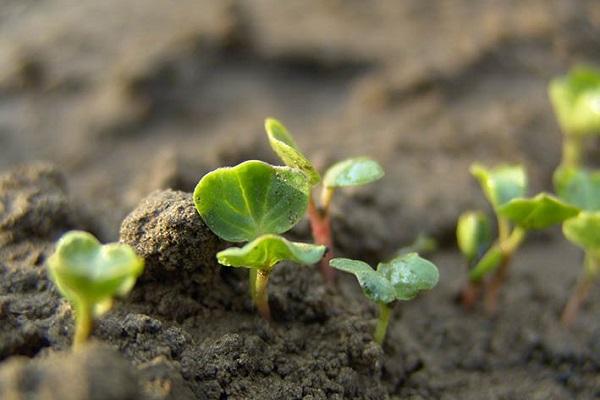
Top dressing
Fertilizers should be applied to well-watered soil. During the season, 3 dressings are carried out:
- in early spring - with urea, potassium sulfate;
- when buds are formed - superphosphate;
- after flowering, for the development of rhizomes - potash and phosphorus fertilizers.
You should start feeding the plant in the fourth year of life.
Pruning
The culture is cut at the root after the first frost. Cut branches are removed from the flower bed.
Mulching
To protect the plant from the sun and drought, the bush is mulched with bark and compost. So the soil is kept in moderate moisture and coolness.
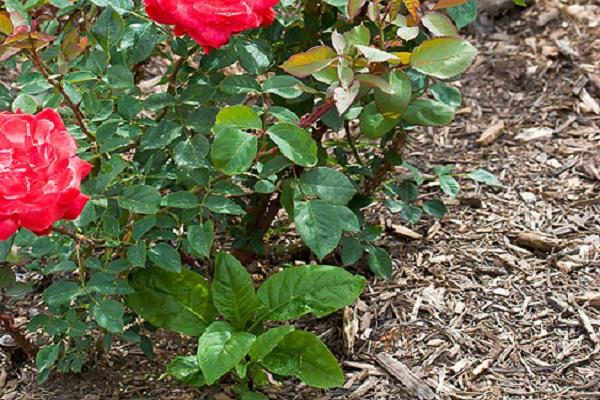
Shelter for the winter
The variety does not require shelter for the winter. If the plants are planted in cold regions with severe frosts, it is recommended to cover the cut bushes with coniferous spruce branches.
Prevention of diseases and pests
Organic farming helps prevent many diseases. You should not abuse nitrogen fertilizing, and mineral fertilizers are applied locally.
Gray rot
To avoid gray rot, the plant should not be poured or planted in places where groundwater flows. Mold is removed with copper sulfate.
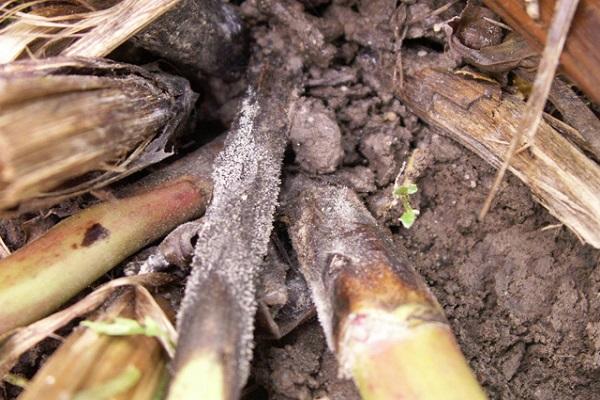
Powdery mildew
The fungus appears during wet weather. It can be destroyed by spraying with a fungicidal solution.
Medvedka
In order to prevent pests, the crop is sprayed with insecticides. You can fight them using folk methods, using poisoned baits.
Aphid
As a preventive measure, it is necessary to fight ants; and remove aphids with insecticides, since it is these pests that are carriers of many diseases.
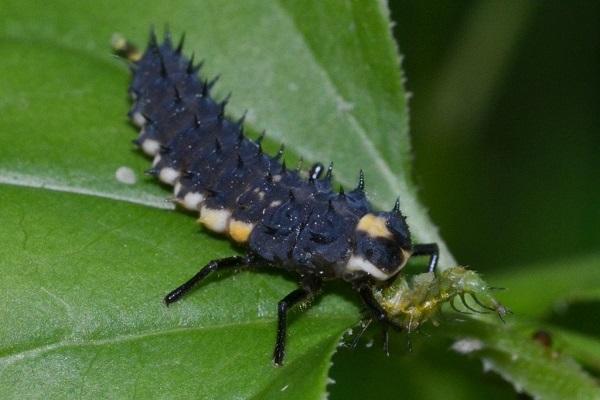
Reproduction
The culture propagates by dividing the root. The procedure is carried out in the fall, after removing all the shoots. For this purpose, the rhizome is cut into several parts with a sharp knife, and the place of cut is sprinkled with ash.
Use in landscape design
The bushes look great in group plantings and in tapeworm. They get along well with many garden plants.
Artificial water objects
Representatives of the variety, planted along the water edge, look beautiful. It is recommended to plant at a close distance from each other.
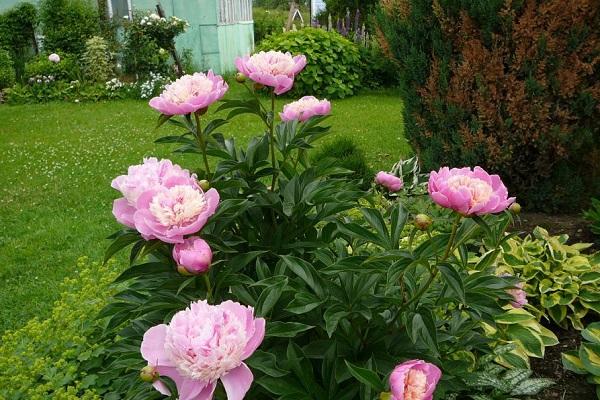
Landscaping of the central entrance to the house or gazebo
The mood is created by cultures located at the entrance to the house, near the gazebo. The ensemble of flowering bushes with seasonal decorativeness looks good.
Separation of garden areas
Shrubs are used to divide the garden into separate zones or to decorate unsightly places. This will not only decorate the garden with beautiful flowering, but also be beneficial.
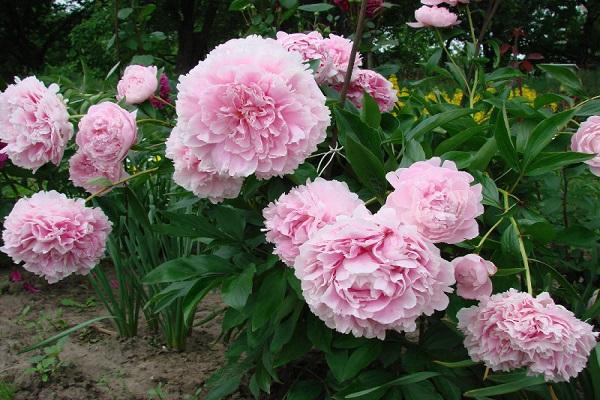
Creating a flower arrangement
The culture looks beautiful near a hedge of lilac, jasmine, honeysuckle. Tulips planted around the perimeter can emphasize the beauty of the bushes. It is recommended to use no more than three bushes in the composition in order to highlight the beauty of flowering bushes and at the same time not overshadow the neighboring flowers.
The decorative variety enchants with double flowering.Unpretentious care is combined with high decorative foliage and buds throughout the season. The plant looks great in landscaping and cut bouquets.
